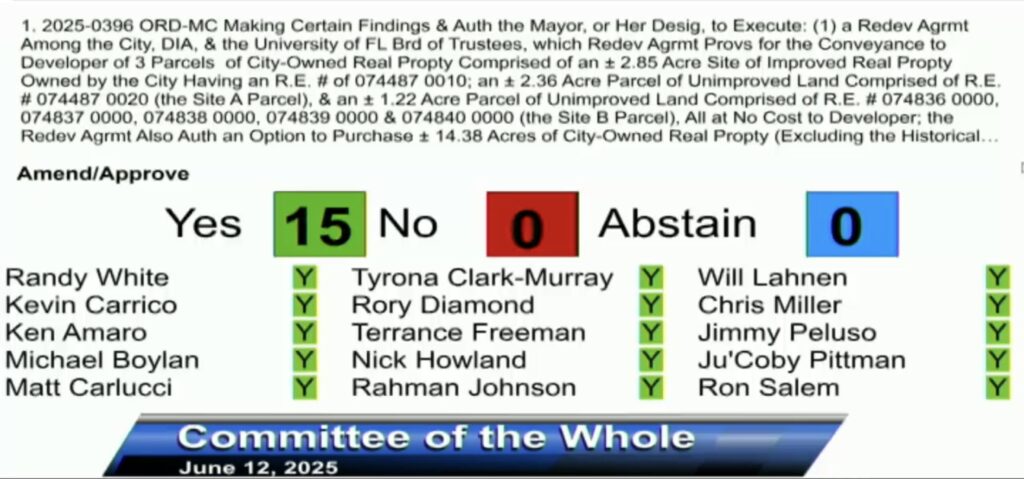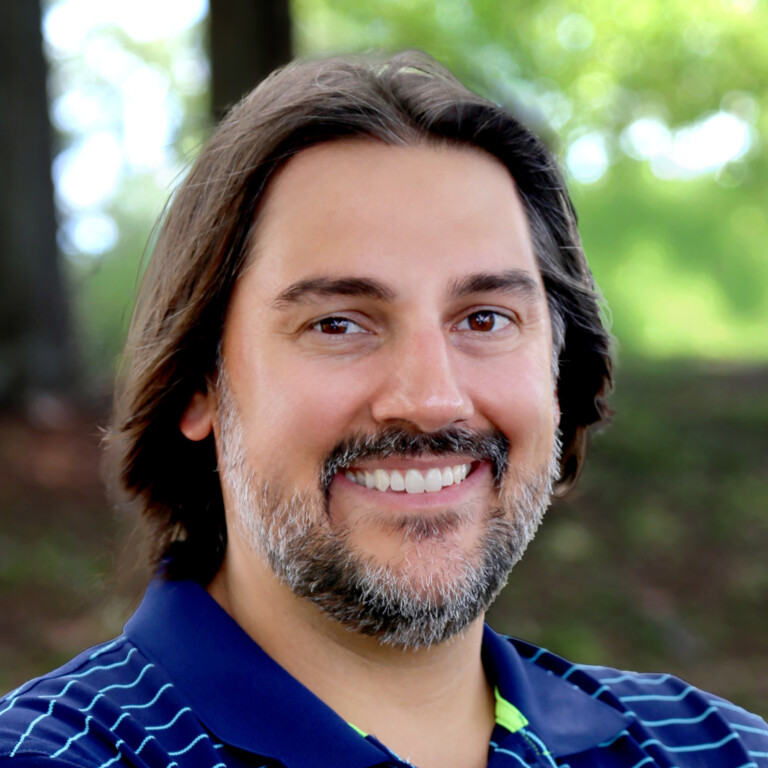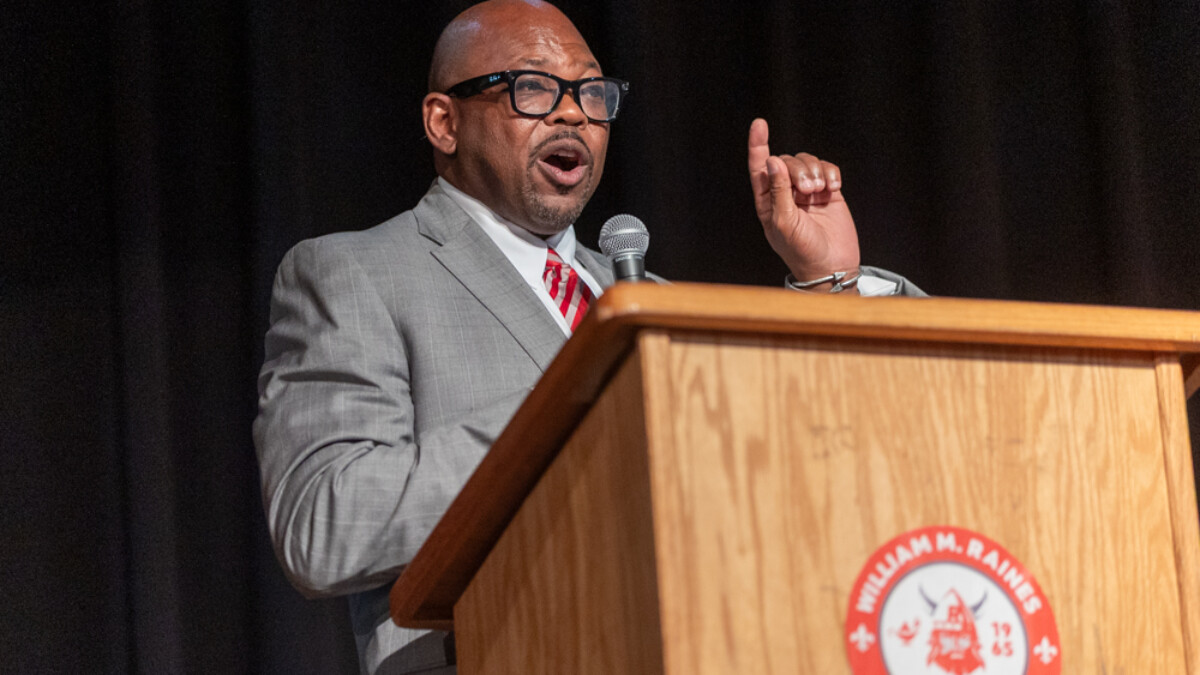Fifteen Jacksonville City Council members have unanimously endorsed a redevelopment agreement with the University of Florida to build an estimated $345 million graduate campus and Florida Semiconductor Institute in LaVilla.
Council members’ preliminary 15-0 vote Thursday on Ordinance 2025-0396 moves the city toward providing UF with more that 25 acres in the historic Downtown neighborhood and a second $50 million cash investment to build the campus.
A final vote is expected June 24. It would bring the city’s total investment in the UF graduate campus since 2023 to approximately $130 million.
Two themes rang constant in Council Chambers leading up to Thursday’s yes vote by the committee — the campus could be “transformational” to Downtown, and it’s pricey for the city.
On Thursday, Downtown Investment Authority CEO Lori Boyer, who has helped lead the city’s negotiations with UF, said, “This legislation will allow us to have a catalytic higher education campus in Downtown Jacksonville.”
To start, UF will move into the former Interline Building in the fall semester with a requirement in the deal that at least 50 students are enrolled by December 2026.
Long-term plans for the campus would lead to two new campus buildings in LaVilla as well as a renovated Prime Osborne Convention Center with restaurants and retail fronting the Emerald Trail and LaVilla’s historic train station added to the campus.
Boyer says the project also could spur development of commuter rail back into LaVilla.
Council member Chris Miller said he initially had reservations about supporting the second $50 million appropriated in the bill due to the potential for budget deficits beginning in 2026.
The City Council Auditor’s Office in August 2024 projected a potential $78 million deficit in 2025-26, which Miller said Thursday could go up to $100 million in fiscal 2027-28, around the time Jacksonville would have to start paying UF $12.5 million per year for the second $50 million investment.
But he says the combined economic benefits of the campus and assurances from the mayor’s office and council to keep the city’s projected deficit in mind, gained his support.
“We’ve needed a 24-hour Downtown for sometime, and fusing this campus and all of the faculty and students that come along with it will go a long way toward doing that,” Miller said. “I just want to make sure we’re all fiscally being honest about the situation we’re projected to be in and that we’re ready to deal with it from a prioritization reprogramming standpoint for those budget and not default to general reserves, which would be easy to do, or talk about raising taxes.”
Mike Weinstein, chief of staff for Mayor Donna Deegan, told council member Nick Howland that the city would consider the UF project a top budgetary priority and pay the $50 million in cash if it’s available.
The university and state would invest $245 million of the total cost of the 20-year project with money already appropriated by the state and $50 million in private donations from the UF Foundation.
UF projects the LaVilla campus will have 685 students with a goal of 1,500 across seven degree programs by 2030 and chips research and advancement at the Florida Semiconductor Institute. University officials said in April that the Jacksonville campus would have around 250 permanent operating jobs; and 4,000 construction jobs over the campus’s first two build phases.
Council approved its first $50 million for the project in March 2023 in the final months of then-Mayor Lenny Curry’s second term, making the city’s total cash investment for the graduate campus $100 million.
That’s bumped to about $130 million when $28.6 million to $31.4 million value of the land is added to the total incentive package, an analysis of the agreement from the auditor’s shows.
UF attorney T.R. Hainline told council that the university has agreed to a request by the council auditor to show proof through a letter from a UF Foundation officer that it has the $50 million in pledged donations — documentation that’s not yet been presented to the city.
Miller also encouraged UF to pursue other funding sources like the CHIPS and Science Act signed by former President Biden in 2022, which includes $52.7 billion in semiconductor funding and research.
U.S. Commerce Secretary Howard Lutnick said last week that President Donald Trump’s administration would renegotiate some of that law, suggesting that some of the act’s grant awards could be cut, according to a report by Reuters.
But Kurt Dudas, vice president of UF’s Office for Strategic Initiatives, told council members that university officials do have meetings scheduled to go after additional funding.

Council members Mike Gay, Raul Arias, Joe Carlucci and Reggie Gaffney Jr. were not present at the Committee of the Whole for the vote.
UF’s recent moves
The UF Board of Trustees gave its approval to the redevelopment agreement June 5.
David Norton, UF’s vice president of research, said the university has started the search for a director to lead the semiconductor institute who would have credibility and experience in national security and with the Department of Defence.
He said the institute would have a “strong coupling” with the campus’s other graduate program tracks and advance chip research working with companies currently in Jacksonville and draw others to the city.
“What do you do with those chips? How do you make them better, faster and cheaper?” he said.
Honoring LaVilla
Community organizers have been working for years with the city and private developers to rebuild LaVilla and preserve its cultural legacy as a historic Black neighborhood and the architectural aesthetics that remain.
Council member Ju’Coby Pittman, who is also CEO of the Clara White Mission, which operates in LaVilla, encouraged UF officials Thursday to create a budget in its plan to contribute to that mission in the design of the graduate campus, and communicate with local nonprofits and community groups operating in the neighborhood.
“I appreciate you all including the historical aspects of LaVilla, because a lot of the historical communities, and I would say Black communities, have been erased,” Pittman said. “And so I want to make sure it is a priority for you all and continue the support of the small businesses.”
According to Dudas, UF intends to have a competition to select a “world-class” design for the campus’s first building. He said they’ve hired consultant Rieth Jones Advisors to help in the search for a project architect.







